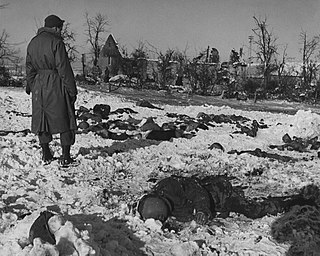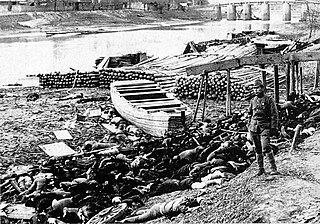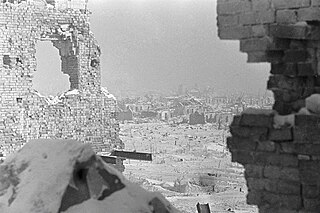Related Research Articles

The International Criminal Court is an intergovernmental organization and international tribunal seated in The Hague, Netherlands. It is the first and only permanent international court with jurisdiction to prosecute individuals for the international crimes of genocide, crimes against humanity, war crimes and the crime of aggression. The ICC is distinct from the International Court of Justice, an organ of the United Nations that hears disputes between states.

A war crime is a violation of the laws of war that gives rise to individual criminal responsibility for actions by combatants in action, such as intentionally killing civilians or intentionally killing prisoners of war, torture, taking hostages, unnecessarily destroying civilian property, deception by perfidy, wartime sexual violence, pillaging, and for any individual that is part of the command structure who orders any attempt to committing mass killings including genocide or ethnic cleansing, the granting of no quarter despite surrender, the conscription of children in the military and flouting the legal distinctions of proportionality and military necessity.
Universal jurisdiction is a legal principle that allows states or international organizations to claim criminal jurisdiction over an accused person regardless of where the alleged crime was committed, and regardless of the accused's nationality, country of residence, or any other relation to the prosecuting entity. Crimes prosecuted under universal jurisdiction are considered crimes against all, too serious to tolerate jurisdictional arbitrage. The concept of universal jurisdiction is therefore closely linked to the idea that some international norms are erga omnes, or owed to the entire world community, as well as to the concept of jus cogens – that certain international law obligations are binding on all states.

The Nanjing Massacre or the Rape of Nanjing was the mass murder of Chinese civilians in Nanjing, the capital of the Republic of China, immediately after the Battle of Nanking in the Second Sino-Japanese War, by the Imperial Japanese Army. Beginning on December 13, 1937, the massacre lasted six weeks. The perpetrators also committed other war crimes such as mass rape, looting, and arson. The massacre is considered to be one of the worst wartime atrocities.

Crimes against humanity are widespread or systemic criminal acts which are committed by or on behalf of a de facto authority, usually by or on behalf of a state, that grossly violate human rights. Unlike war crimes, crimes against humanity can be committed during both peace and war. They are not isolated or sporadic events because they are part of a government policy or they are part of a widespread practice of atrocities which is tolerated or condoned by a government or a de facto authority. They do not need to be part of an official policy, but they only need to be tolerated by authorities.

The Rome Statute of the International Criminal Court is the treaty that established the International Criminal Court (ICC). It was adopted at a diplomatic conference in Rome, Italy on 17 July 1998 and it entered into force on 1 July 2002. As of November 2023, 124 states are party to the statute. Among other things, it establishes court function, jurisdiction and structure.

The International Military Tribunal for the Far East (IMTFE), also known as the Tokyo Trial and the Tokyo War Crimes Tribunal, was a military trial convened on 29 April 1946 to try leaders of the Empire of Japan for their crimes against peace, conventional war crimes, and crimes against humanity, leading up to and during the Second World War. The IMTFE was modeled after the International Military Tribunal (IMT) at Nuremberg, Germany, which prosecuted the leaders of Nazi Germany for their war crimes, crimes against peace, and crimes against humanity.

The Empire of Japan committed war crimes and crimes against humanity in many Asian-Pacific countries during the period of Japanese imperialism, primarily during the Second Sino-Japanese and Pacific Wars. These incidents have been described as "the Asian Holocaust". Some war crimes were committed by Japanese military personnel during the late 19th century, but most were committed during the first part of the Shōwa era, the name given to the reign of Emperor Hirohito.

Radhabinod Pal was an Indian jurist who was a member of the United Nations' International Law Commission from 1952 to 1966. He was one of three Asian judges appointed to the International Military Tribunal for the Far East, the "Tokyo Trials" of Japanese war crimes committed during the Second World War. Among all the judges of the tribunal, he was the only one who submitted a judgment which insisted all defendants were not guilty. The Yasukuni Shrine and the Kyoto Ryozen Gokoku Shrine have monuments specially dedicated to Pal.

UNESCO's Memory of the World (MoW) Programme is an international initiative launched to safeguard the documentary heritage of humanity against collective amnesia, neglect, decay over time and climatic conditions, as well as deliberate destruction. It calls for the preservation of valuable archival holdings, library collections, and private individual compendia all over the world for posterity, the reconstitution of dispersed or displaced documentary heritage, and increased accessibility to, and dissemination of, these items.

International criminal law (ICL) is a body of public international law designed to prohibit certain categories of conduct commonly viewed as serious atrocities and to make perpetrators of such conduct criminally accountable for their perpetration. The core crimes under international law are genocide, war crimes, crimes against humanity, and the crime of aggression.

Sir William Flood Webb was an Australian lawyer. He was the Chief Justice of Queensland and a judge of the High Court of Australia. He was appointed President of the International Military Tribunal for the Far East by General Douglas MacArthur, commonly known as the Tokyo trial, after the end of World War II.
Transitional justice is a process which responds to human rights violations through judicial redress, political reforms in a region or country, and other measures in order to prevent the recurrence of human rights abuse. Transitional justice consists of judicial and non-judicial measures implemented in order to redress legacies of human rights abuses. Such mechanisms "include criminal prosecutions, truth commissions, reparations programs, and various kinds of institutional reforms" as well as memorials, apologies, and various art forms. Transitional justice is instituted at a point of political transition classically from war to positive peace, or more broadly from violence and repression to societal stability and it is informed by a society's desire to rebuild social trust, reestablish what is right from what is wrong, repair a fractured justice system, and build a democratic system of governance. The core value of transitional justice is the very notion of justice—which does not necessarily mean criminal justice. This notion and the political transformation, such as regime change or transition from conflict are thus linked to a more peaceful, certain, and democratic future.

A crime of aggression or crime against peace is the planning, initiation, or execution of a large-scale and serious act of aggression using state military force. The definition and scope of the crime is controversial. The Rome Statute contains an exhaustive list of acts of aggression that can give rise to individual criminal responsibility, which include invasion, military occupation, annexation by the use of force, bombardment, and military blockade of ports. Aggression is generally a leadership crime that can be committed only by those with the power to shape a state's policy of aggression, rather than those who carry it out.

Superior orders, also known as the Nuremberg defense or just following orders, is a plea in a court of law that a person, whether a member of the military, law enforcement, or the civilian population, should not be considered guilty of committing actions that were ordered by a superior officer or official.
Julian Neil Rohan Wadham is an English actor of stage, film and television.

Sir Erima Harvey Northcroft was a New Zealand lawyer, judge, and military leader. His papers from the Tokyo War Crimes Trial are held by the University of Canterbury.
Humanitarian Law Center (HLC) is the Serbian non-governmental organisation with offices in Belgrade, Serbia, and Pristina, Kosovo. It was founded in 1992 by Nataša Kandić to document human rights violations across the former Yugoslavia in armed conflicts in Croatia, Bosnia and Herzegovina, and, later, Kosovo.

Pride, also known as Pride: The Fateful Moment, is a 1998 Japanese historical drama directed by Shunya Itō. The film, based on the International Military Tribunal for the Far East of 1946–48, depicts Japanese prime minister Hideki Tojo as a family man who fought to defend Japan and Asia from Western colonialism but was ultimately hanged by a vengeful United States. Shot at a cost of ¥1.5 billion and partially funded by a right-wing businessman, Pride was one of the highest-grossing Japanese films of 1998 and was nominated for two Japan Academy Prizes. Although the filmmakers intended the film to open dialogue on Japanese history, it was controversial in China, South Korea, and Japan owing to concerns of historical denialism.

Tokyo Trial is a 2016 historical drama miniseries that depicts the International Military Tribunal for the Far East. An international co-production of Japanese public broadcaster NHK, Dutch studio FATT Productions, and Canadian producer Don Carmody, the series was directed by Pieter Verhoeff and Rob W. King.
References
- ↑ "First inscription from Macao on Memory of the World Register at MOWCAP 4". Archived from the original on 14 March 2015. Retrieved 10 February 2020.
{{cite web}}: CS1 maint: bot: original URL status unknown (link) - ↑ Asia/Pacific Region MOWCAP Register
- ↑ "UC's war crime archive receives international recognition". Archived from the original on 3 May 2010. Retrieved 29 April 2010.
- ↑ Justice Erima Harvey Northcroft Tokyo War Crimes Trial Collection MB1549